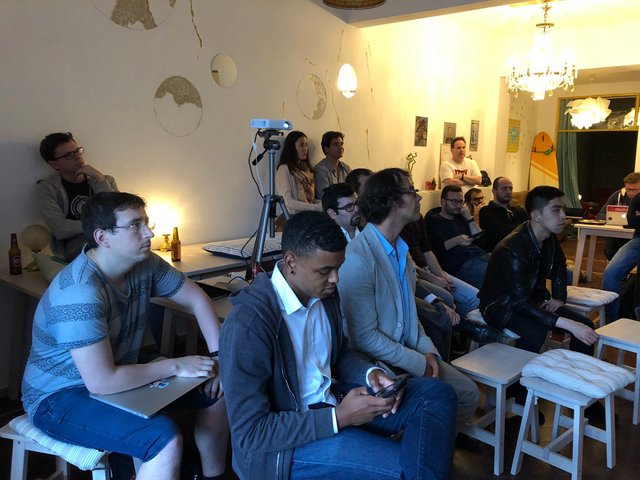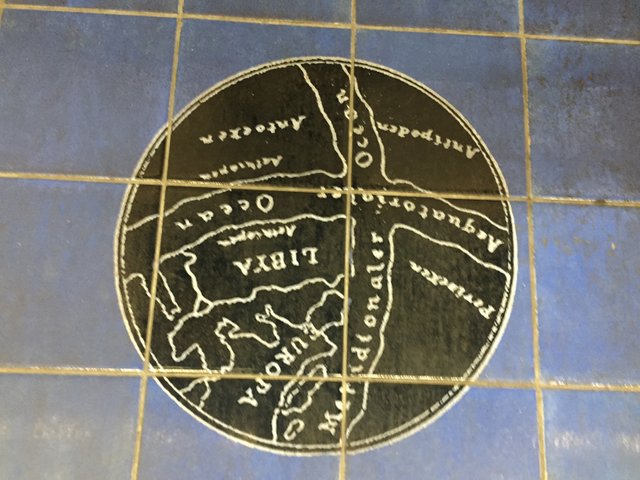City #2 for the Cryptocurrency Travel Diary
Last month I was in Lisbon, Portugal. Below are a series of thoughts from my notebook that aren't likely to make it into the final article for Coin Center. Nevertheless, they provide an inside look at the thought process that leads to the end result. These notes were sparked by a book I read during the month: 'Pioneers of Globalization: Why the Portuguese Surprised the World' by Jorge Nascimento Rodrigues and Tessaleno Devezas. I hope you enjoy!
On Lisbon as a hub of globalization

One reason that cryptocurrency is fascinating to me is because of how quickly it has become a global trend (or some might call fad). That I am traveling across the world this year and able to meet a different community of people interested in and working on cryptocurrency projects is testament to the speed and reach of technological change in the 21st century.
Lisbon is an interesting case study in that it was in many ways the first globalized, European city. Writing about Lisbon during its 'siglo de ouro' (Golden Century), we get the following description:
"Lisbon was, at the time, a metropolis buzzing with activity, the hub of the highly lucrative trade routes, and the jumping off point where pilots, astronomers, merchants, sailors and adventure seekers from all parts of the known world ?>converged searching for employment, fortune and glory" p176
During the last month, very quickly it became apparent to me that many foreigners in Lisbon today seek these very same things through cryptocurrency-related projects (they also like the sun, low living cost and no capital gains tax). I spent time a lot of time meeting American, Australian, Brazilian, French, Swedish and British citizens (among many others). Somewhat by accident, Lisbon is again hosting a very small but active community of cryptocurrency enthusiasts.
"Those seafarers and entrepreneurs who clearly saw their opportunities, understood their era, and ventured to the >horizons with a combined sense of utopia and pragmatism". 18
"It was navigating against the wind that the 18th century pioneers of the sea were shaped. It will similarly be against the >barriers of clarified convention, fatalism, and ignorance that new pioneers will arise." 19
One could say the same thing - but would have to substitute the wind and sea for data and the internet - about cryptocurrency today. Given the amount of noise and misplaced belief in and against cryptocurrency, there's a good chance that once again it will be those who push back against convention, fatalism and ignorance who end up benefitting. In many ways, those who have already succeeded from the rapid rise in BTC and ETH over the past 3 years have proved this passage to still be relevant.
On speculation

"Expansion brought together two fundamental ingredients: the compelling force of the unknown and the attraction to >high-profit commodities". 28
What's interesting to me about this phrase is that it sums up the motivations - separate but somewhat inseparable - of the technical and speculative cryptocurrency communities.
I spent much of my time with the technical community in Lisbon. There is also an investment (or 'speculative') community. An interesting dynamic exists between these two communities. On the one hand, the technical folks look down somewhat on the speculative folks (presumably because they're only interested in the money). On the other hand, it is the speculators who have made the initial technical investors rich. Moreover, speculation is just the latest use case for cryptocurrencies (with purchasing on Silk Road being one of the first - then evading capital controls one of the next). These forces go hand-in-hand and are not limited just to cryptocurrency. In many ways the history of technological change is this story over-and-over.
On the movement of people and technological advancement

Sometimes technology and technological change are talked of as if they were autonomous and inevitable forces. Yet people play a major role in what technology is developed, where it is developed, and who uses it for what purposes. The impetus for Portugal's international expansion was provided by a relatively sophisticated system of information collection and gathering of unique, multidisciplinary experts at the time:
"Prince Henrique's initiatives related to information management"... "he decided to attract to Portugal a scientific elite from other parts of Europe, initiating discussions among experts and scholars with diverse scientific background (navigation, astronomy, cartography, etc)... One can refer to the creation of the first think tank, known in history as Sagres >School'" 62
The idea of the Sagres School is fascinating to me. Its physical existence is possibly apocryphal though there's no doubt that a collection of bright and diverse people were brought together [by Prince Henrique 'the Navigator'] and invented technologies that lead to the Portuguese 'Age of Navigation'.
A similar dynamic exists today with the cryptocurrency community in Lisbon though it is not directed from the top-down. Rather, a group of bright and diverse people have converged around a new technology. Many have made quite a bit of money as early adopters and therefore do not have to rely upon the largesse of financiers, patrons or the state to conduct their investigations and research. While the benefits from their work might not accrue directly to the Portuguese state, I would posit that their presence in Lisbon means some of the benefits will rub-off on local Portuguese people who collaborate with the community.
The process of knowledge accumulation and scientific advancement in Lisbon eventually went into reverse as the siglo de ouro wound down and the Spanish, then Dutch and British, eclipsed the Portuguese.
"The 'brain drain' throughout Europe, of which Portugal was the beneficiary during the periods of Prince Henrique and King João II, turned in reverse direction. The pool of Portuguese talent became fodder for the expansion dynamics of >Spain, France and England" 121
Whether such a process could repeat itself with the cryptocurrency scene, I do not know. However, someone did mention to me that they hope to be able to attract back many of the people who left the country following the 2009-2014 economic and banking crisis. In particular, these expatriates have gathered knowledge and learned skills that they would not have been able to develop had they remained in Portugal. This may perhaps be the key to the Portuguese people's ability to ride this latest wave of globalization and technological change - as they did in the 14th century.
On incorrect conventional knowledge

José Vizinho... proved that navigation south of the equator was possible, contrary to popular beliefs at the time". 63
"Bartholomeu's feat - the most noteworthy maritime voyage of the 15th century, according to some - had a psychologically 'tectonic' impact; the 'Tenebrous Sea' had been definitely conquered and the 'passage' to the other side was secured, without monsters (among them the famous Adamastor) and other legendary demons. It was thereby established as a certainty that the waters of the two oceans (Atlantic and Indian) were connected, and demolished >definitively the myths from Ancient times and the Middle Ages" 141
The Portuguese 'Age of Discovery' was in many ways a consequence of and impetus for debunking of conventional wisdom that had been held in Western Europe for many century beforehand. The excerpts above point to the idea at the time that navigation south of the equator was impossible - a belief that quickly fell apart as explorers departed from Lisbon.
History is replete with examples of conventional knowledge that was later disproven. What's interesting to me is the reason that incorrect conventional knowledge spreads and persists - as well as the consequences of this incorrect information on people's lives.
This has relevance to cryptocurrencies in the sense that many are being forced to confront questions around the viability and value of fiat currencies for the first time. Fiat currency with no intrinsic backing is a relatively new invention (particularly in the US where the gold standard was abandoned in the 1970s). Those who have not lived outside their own country - particularly in places where sound fiscal and monetary policy don't exist - have not had to do this before. That fiat currency would be some kind of monetary end-state makes about as much sense as Fukuyama's End of History in the 1990s (i.e. that liberal democracy was the only kind of successful government going forward).
"Prince Henrique explicitly indicators, for the first time, to Antão Gonçalves on his journey to Rio do Ouro that the mission would be 'to get wisdom, from India (Ethiopia), and from Prester John's homeland, if possible." 81 ... "Due to this myth [of Prester John], the Portuguese Explorers spent more than 120 years embarked upon and embroiled in an empty hope, until >the truth came to light" 96
I had not realized that much of the motivation for the Portuguese discoveries was a search for the mythical lands of Prester John. For those not familiar, many Western Europeans thought that Prester John's Christian kingdom lay to the east of the largely Muslim-controlled territories at the time. It turned out that this piece of conventional wisdom was wrong though only after hundreds of years of attempted search and substantial amounts of spent resources (for more see: https://en.wikipedia.org/wiki/Prester_John).
The interesting idea here is that people can pursue fictitious and ultimately unachievable goals yet they can still accomplish a great deal in doing so. The Portuguese ended up with one of the first global empires. So too the cryptocurrency adherents - with their dreams of total decentralization (whatever that means) - may not end up achieving this goal but could still end up building some ultimately transformative technology in the process.
On unstable currency

"At the dawn of the 15th century, when Prince Henrique had not yet justified his nickname, 'the Navigator', the Chinese in the Ming Dynasty launched seven expeditions toward the Indian Ocean, going well beyond their traditional oceanic sphere of influence. Their objective was to assert hegemonic role [sic] in that part of the world, but, in 1433, they would cease this expansion as a consequences of the reactionary movement of the Chinese Confucian bureaucracy and amidst of a crisis of >hyperinflation". 73
"Following in the steps of his father, João III sells treasury bonds (named padrões de juros) which in turn made debt skyrocket and consequently transformed the securities into what they sardonically termed 'distressed papers' (papers of >little worth, sold at 5% of face value)." 116
A recurring feature of this travel series, after only two months, is the idea of unstable currencies and excessive government spending/borrowing. Recall that Bitcoin was a reaction against bank bailouts and the financial crisis of 2007-2008. Recall as well that, over the past decade, many governments around the world have embarked upon extensive 'quantitative easing' to kick-start their economies and partially finance public budgets that have been and will continue to be in the red for the foreseeable future.
There's not a lot new under the sun - and poorly managed finances, debased currencies and worthless securities are are very old phenomena. Cryptocurrencies are a reaction to these phenomena - though they suffer from the same forces of speculation, poor governance and fraud that affected the systems that they're nominally intended to either replace or substitute.
The article summarizing the month in Lisbon will appear on the Coin Center website next week.
Check out the previous travel diary article on Cape Town: https://coincenter.org/entry/coin-center-travel-series-cape-town-south-africa
More notes from previous cities are here: https://steemit.com/@bendean
You can follow me at http://www.twitter.com/benjamindean
The rest of the cities on the itinerary are here: https://coincenter.org/entry/coin-center-travel-series-how-cryptocurrency-is-being-used-around-the-world!
Congratulations @bendean! You received a personal award!
You can view your badges on your Steem Board and compare to others on the Steem Ranking
Vote for @Steemitboard as a witness to get one more award and increased upvotes!
Downvoting a post can decrease pending rewards and make it less visible. Common reasons:
Submit